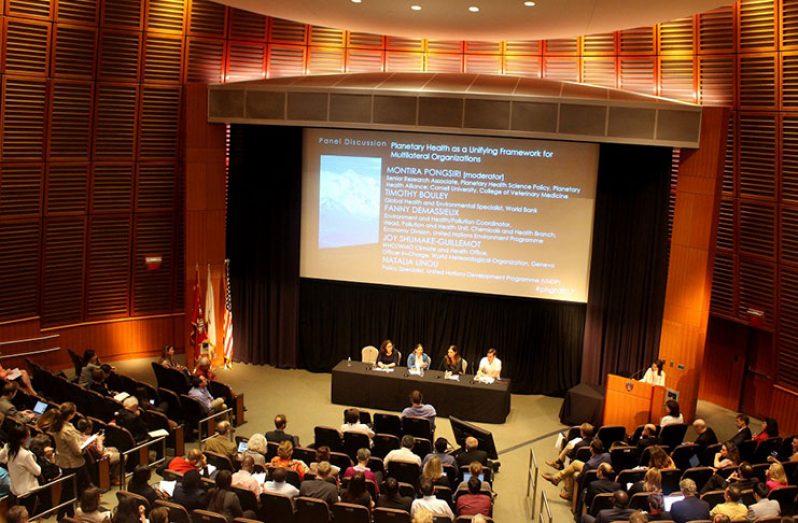By Alva Solomon in Boston, Massachusetts
GLOBAL health and environmental challenges facing the planet are being brought under the microscope as the Harvard University-based Planetary Health Alliance (PHA) collaborates with a diverse group of stakeholders to dissect the impact on human health caused by global environmental change.
The body along with its partners, the American Geophysical Union, the Ecological Society of America, and The Lancet have organised the Inaugural Annual Meeting on Planetary Health and GeoHealth, which is being held at the Harvard Medical School in Boston, Massachusetts.
The two-day conference is funded by the Rockefeller foundation and brings together a diverse group of over 300 participants including students, investigators, instructors, policy-makers, and other interested individuals who are committed to understanding and communicating the human-health impacts of global environmental change.
Michael Myers, Managing-Director of the Rockefeller Foundation, told participants at the opening of the conference on Saturday at Harvard that the annual meeting is a historic one where the group meets to address the challenges facing Earth.
He said that the foundation on attaining its 100th anniversary in 2013 organised a series of consultations, and one such forum focused on global health and accompanying challenges.
He said the first investment made by the foundation was the formation of the Rockefeller Lancet Commission, and according to him in 2015, the commission released a report which called for “urgent attention” to the health and environmental issues facing the planet.
Against that backdrop, the foundation invested in the PLA to connect stakeholders, including those in practice and future leaders.

On Saturday morning, a number of presentations were made by participants in the conference. These included Dr Phillip Landrigan, Dean for Global Health at Mount Sinai School of Medicine, who addressed the issue of pollution which he noted is one of the major causes of major diseases.
He said the drivers of pollution are urbanisation, industrialisation as well as the relocation of toxic industries. Dr Landrigan, who also chairs The Lancet-Mount Sinai Global Commission on Pollution & Health, noted that the traditional forms of pollution such as water pollution, are decreasing; however, the number of deaths caused by other forms such as chemical pollution, are increasing.
He said that more than 70 per cent of diseases caused by pollution are the non-communicable diseases, noting that chemical manufacturers are among the key factors involved in the issue. According to Dr Landrigan, there is the thought that new chemicals will bring benefits to the planet; however, “it’s not until after the fact that we learn new chemicals cause damage and harm.”
Noting that children are among those who suffer the most from pollution, Dr Landrigan said pollution “is totally a human rights issue,” adding that it is poor communities which suffer the most from the process.
The conference first day of events also saw presentations on a variety of topics and these included university leadership in advancing planetary health, a drop in fish-catch which threatens human health, as well as securing sustainable and nutritious food systems through mainstreaming agricultural biodiversity.
According to the PHA , the objective of the forum is to showcase the extraordinary momentum that is taking place around the world in the field of planetary health, while highlighting institutional developments, emerging investigators, research developments, and applications to policy-making and natural resource management.



.jpg)








